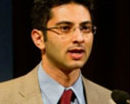Sherif Girgis and Robert George think the current marriage debate has started on the wrong point.
“The way we’ve thought of it — or the way it’s been framed for us as — is as something about the equality of the LGBT community. But it’s not about the eligibility requirements. You have to know what marriage is — and why it’s important for policy.”
Speaking to a packed room in a morning breakout session Sept. 24 at the World Meeting of Families in Philadelphia, Girgis, a post-doctoral candidate at Princeton and Yale universities, was one of two speakers presenting a talk titled “Creating a Flourishing Marriage Culture.”
[hotblock]
Together with his mentor and former professor at Princeton, Robert George, they are co-authors of a book defending traditional marriage from a nonreligious, classical perspective.
Framing the question less as one of exclusion and inclusion, Girgis nonetheless spoke about two opposing views of marriage: a conjugal, or traditional, view; and a revisionist one. Regardless of religious perspective, Girgis explained the political importance of conjugal marriage as “fundamentally right by the light of natural reason,” he said.
The problem, he said, is that at the beginning of the debate on marriage equality, nobody asked about the inherent nature of the institution. The things that are “fundamentally right about the nature of marriage cannot be explained by the revisionist view,” Girgis said.
A revision view, he said, rests essentially on “a deep emotional bond; your relationship with ‘your number one’ or, if one likes, the ‘soulmate view.’”
Attractive as it may seem, he said this view that even shapes many opposite-sex relationships ends up collapsing into a number of arbitrary distinctions. The inherent aspects of a conjugal union — what he defined as permanence, exclusivity, monogamy and sexual union — have no place in the revisionist view if marriage is only
ordered to an emotional, and thus unstable, bond.
Enshrining this view in law has consequences because “the law teaches. Law shapes culture and culture shapes what people do,” Girgis said.
Robert George built on these points in the second portion of the session. He addressed the concerns of parents for their children in a society that teaches a poor definition of marriage to young people — not just in the current marriage equality debate but in terms of divorce, cohabitation outside of marriage, and a lack of commitment in relationships.
There is, he said, a very powerful and compelling argument that has nothing to do with religious opinion at all.
“Marriage,” according to the definition of George and Girgis, “is the relationship into which a man and woman enter that is naturally ordered to procreation and the rearing of children and would be fulfilled by any couple if they are blessed with children.”
George clarified that the phrase “ordered to” does not mean infertile couples are somehow invalidly or illicitly married. Such claims, he said, risk “instrumentalizing” marriage to the end of childbirth.
But marriage “is not of mere means to end. Marriage is an ends in itself. But a particular type of end. A particular good. A conjugal bond. And it’s that understanding of marriage that is at the heart of the family,” George said.
The state has a stake in the family and in the structure of marriage. The problems of broken homes — of the fatherless, of the abandoned — that politicians are quick to pick up as important are not solved by money. Rather, George said, they are ones that must be taught by the values the law espouses. By dismantling the structures of father and mother,the state creates a culture of indifference to the inherent reality of that structure.
“We cannot solve this with money,” George said. “We cannot solve this with economic development. Glamorizing this attitude toward sexuality is the greatest injustice you can inflict on poor people, black or white.”
The culture should reinforce and teach that structure in order to rebuild and reverse the horrific trends of broken homes and the crime, depression and abuse that follow from them, he suggested. Society must understand why past cultures, the majority of which have been non-
Christian, have espoused the conjugal view of marriage. Contemporary culture, George asserted, must re-learn why human beings have chosen to perpetuate traditional marriage as an institution by understanding its true nature.
PREVIOUS: Do more than talk about religious vocations, speakers say
NEXT: Parking policy forces unexpected closure of vendor exhibits





Share this story